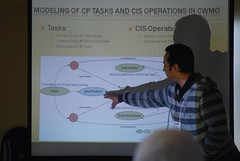Third Atlantic Workshop on Semantics and Services - blog summary - part 2.
A Semantic Web based Framework for Modeling and Simulating Clinical Pathways
Ali Daniyal
The problem is the analysis and execution of clinical pathways for decision support.
Our approach is to mode the domain knowledge in RDF/ontologies.
Medical experts usual write ontologies, but they may not be experienced at writing process logic. We create a workflow model. The idea is to provide an intuitive model for medical experts.
(Very difficult to follow; slides are unreadable; presenter speaks in long run-on sentences that gradually get softer and softer until they just sort of tail off….)
CP Workflow Model Ontology (CWMO) – developed to describe workflows. UML activity diagram constructs used to model flow of control in CWMO. Data flows from one process to another; OWL-S bindings are used to capture data flow.
(Professor Abidi explains – the main point here is that we are able to simulate the computerized representation of clinical pathways before we try to apply them into a hospital – “there are the conditions, is this what you were looking for?” etc.)
Strategy for Partnership and Innovation
Jason Frenette, NSERC
The objective of the presentation is to give an overview of the funding opportunities.
NSERC works with industry as well as academia, and tries to promote partnerships. Over the last few years, we noticed only 2% of small R&D performers were working with NSERC. So we have an awareness challenge.
NSERC has two key approaches
- research partnerships through universities and colleges
- industrial scholarships and fellowships
New tools to make partnerships easier: interaction grants, engage grants
Interaction grants: used to help academic researchers establish new partnerships with companies. They identify a company-specific problem which could be solved through a subsequent sponsorship. It’s travel funding, to visit the company. It’s quick (2-week turnaround) and small ($5000).
Engage grants are intended to foster these partnerships, for short-term R&D based partnerships, up to $25K to work on a company-specific problem, to help the academic bring in students, get equipment, etc. Within a month the project can get going. Note that any IP generated resides with the company.
Example: Atwood (of kipici.com) worked with Kenneth Kent, UNB, semantic techniques applied to relationship matchmaking.
Also, other opportunities:
- Industrial Undergraduate Student Research Awards (IUSRA) – up to $4K for a 4 month project to work with a company; the company provides minimum of $1,125.
- Industrial Postgraduate Scholarship (IPS_ - up to 15K, company up to $6K per year, the student has an academic and company supervisor
- Industrial Research and Development Fellowship (IRDF) – allows a company to hire a recent PhD graduate to see whether they’re a good fit with the company (company must invest $10K+)
NSERC e-bulletin – “In Partnership” – publishes every three months. http://nsercpartnerships.ca
Why should industry partner with NSERC? Stretches research dollars, lowers risk, problem-solving, access to world-class experts, access to new ideas, long-term productive relationships.
Feature Model Debugging based on Description Logic Reasoning
Mahdi Noorian and Alizera Ensan
Team-former supports the formation of teams of health-care experts based on the N3 rule language. Each expert can create a personal profile, etc.
Teams are composed of two parts:
- cancer care experts
- supportive experts, such as social worker
The approach:
- build knowledge bases, then build inference rules.
Knowledge areas include: patient preferences, user-required skills, etc. The knowledge base contains information specific to each expert.
Notation 3 (N3) http://www.w3.org/DesignIssues/Notation3 is the notation, & Euler is rule-engine being used. N3 are ‘slotted subject descriptions’:
- subject : - fact or ? - query
- property
- object
eg. [a : whatever : whatever
: whatever : whatever ]
When the query is submitted, the system matches the experts by services provided (and frequency of provision).








0 comments:
Post a Comment